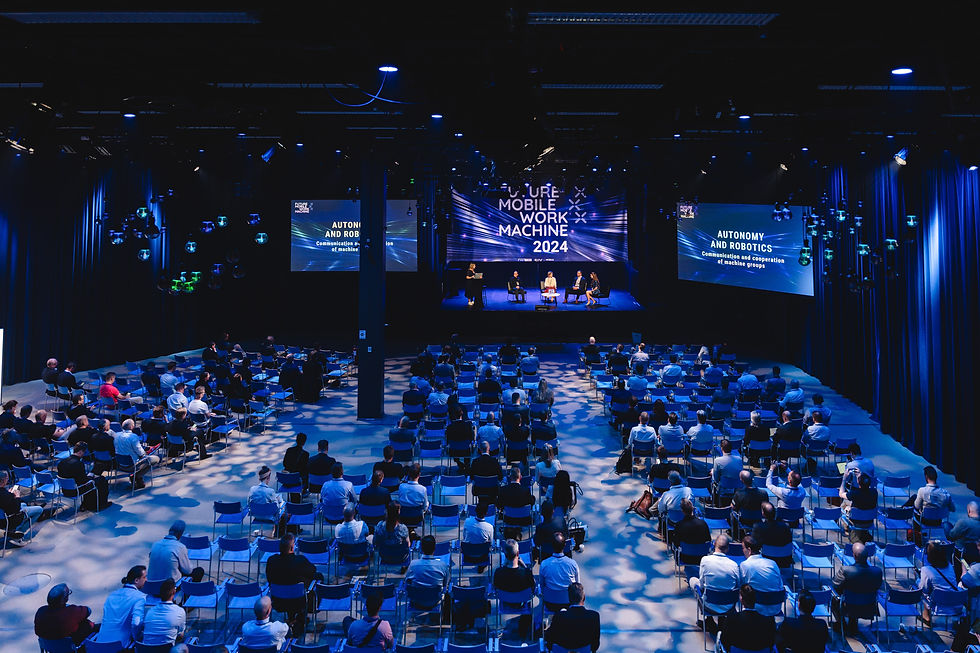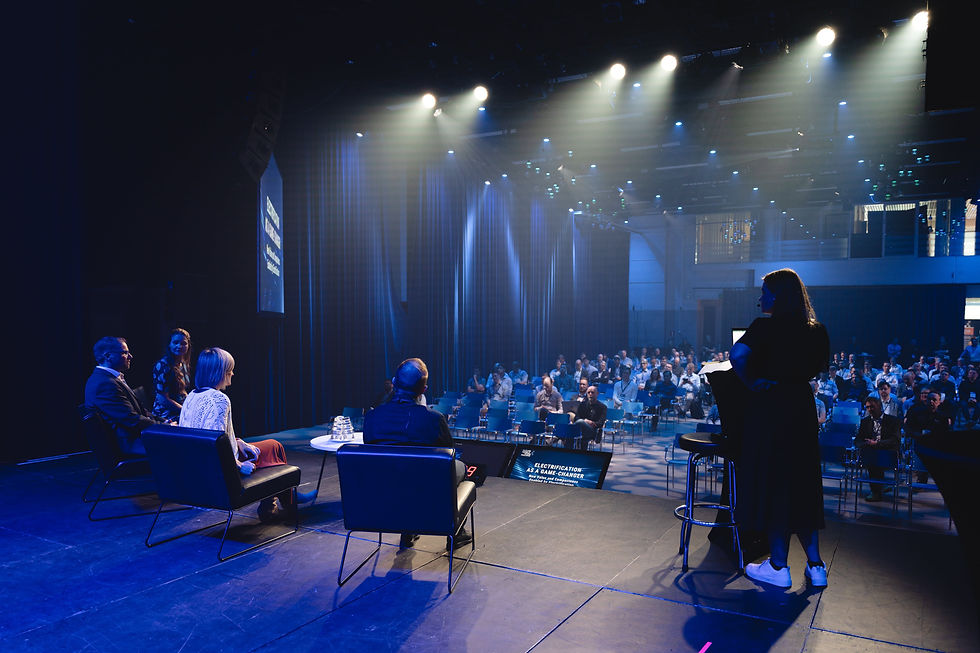Autonomy, electrification and alternative energy sources, AI, sustainability and of course future of the mobile work machines, to mention a few topics from the biggest mobile work machine event of the year: Future Mobile Work Machine 2024 organized by SIX Mobile Work Machines cluster and FIMA Forum for Intelligent Machines ry. The event was arranged 28.-29.5. as a 2-day-happening at Tampere Hall, Tampere, Finland. It was the third time, and certainly the biggest and most international version of itself, so far. Tamlink's great team was the main organising team.
This year the aim was to get more international participants and to scale up the whole event. Those goals were fulfilled as we had over 350 people from 11 different countries and 3 different continents: Asia, North America and Europe. Only 12 registered people didn’t show up and we were still over booked, just like last year.
The venue at Tampere-talo was spectacular with its lights and admirably functional technology which didn’t let us down at once! The facilities and exhibitor booths were created by Brawo! Branding Company with reusable materials.

Our event hostess Milla Madetoja, familiar from the Yle Finnish Broadcasting Company news, brought radiating energy to the stage with her strong experience and talent.
During and after the event people shared their feedback face to face and digitally. People were very happy with the facilities and arrangements. Also, the quality of the audience was complimented. We were told that the “right people were there” and that it truly was a “world class event” and “the place to be”. What more could we have asked for?

About the main topics
The event programme consisted of four main themes: Mobile Machine 2035, Sustainability in Mobile Machines, Future Work Site and Future Competences. In the big picture, there weren’t any big surprises from the speakers, instead a lot of common understanding, even between competitors such as Konecranes and Kalmar or John Deere and Ponsse.
It became clear in the presentations and speeches, that the green transition and sustainable actions are on the agenda of companies for reasons other than just regulation. Great! Also, sustainability isn’t only about electrification, it is a cross-cutting theme that is embedded in machine design & manufacturing, logistics, work processes etc.

The big topics of the industry from the last few years, automation and autonomy, and electrification of power trains and actuators, are still valid and every machine manufacturer needs to address this development. However, the diversity of non-road mobile machinery and their operating environments means that in different domains e.g. mining or forestry, the implementation of autonomy and electrification is different both in timeline and functionality.
Sustainable power solutions include also other energy carriers such as hydrogen and biofuels. Also, automation and autonomy are seen easier to achieve in the machinery industry than in the automotive sector, mainly because work environments are usually more or less confined environments.
Increasing automation and the utilization of AI will change the role of humans and take it more in the direction of process supervisors as opposed to operators and doers of the actual work. Also, companies producing mobile machines need to make the factory work more appealing. To get new generations of experts working in factories it needs to be safe, intelligent, clean, and served with up-to-date analytics.

In engineering and machine design the meaning of multidisciplinary efforts is highlighted. The machines of the future will be designed by new types of experts, but traditional fields of expertise cannot be forgotten either. Mechanical and structural engineers etc. will still be needed in the future, but multidisciplinarity will be emphasized.
The role of simulation in design will be emphasized even more, and both design methods and tools will support a multidisciplinary approach in the future and facilitate communication between engineers. Educational models with active industrial cooperation have also been found to be good in higher education.

The event atmosphere was open and sincere
There was an atmosphere of cooperation, where even competing companies were enthusiastic about open discussions about future and common challenges.
Many people were surprised and happy about the quality of the concrete communication and conversations between people. Everyone was sharing the same thoughts about sustainability.
Event exhibitors gave feedback that they were extremely happy with the audience as there were, from their angle, only valuable people according to their businesses.
One of the keynote speakers, Carolina Diez Ferrer from Volvo Constructions Equipment, said that she really appreciated the openness and sincerity of the conversations at the event.
It was said that everyone enjoyed the face-to-face meetings and conversations very much.

Every mobile work machine company is under the same challenges with the twin transition. We have to find more sustainable and greener ways to produce and utilize the machines. It was noted that we are all in front of the same challenges and we can face them together with collaboration.
In the event it was announced that there will be a Future Mobile Work Machine 2025.
Stay tuned for the upcoming date!

Thank you Tampere-talo, Brawo! Branding Company, East Coast Events Oy for event photography and video, Tampere University, Business Tampere, Business Finland, hostess Milla Madetoja.
Thank you, all the exhibitors: Exertus Oy, Epec Oy, GIM Robotics, Sandvik Mining and Rock Solutions, Valmet Automotive, Kindhelm, Wapice Ltd, Normet Group, Kalmar, Danfoss Editron, Novatron, Vaisto Solutions, SATEL Oy, Ponsse, Nokia, VTT and Technion Oy.
Special thanks to our sponsors ABB, Gofore, MathWorks, TK Engineering Oy, Plugit Finland, Bosch Rexroth and RISE Research Institutes of Sweden.
Thank you to the event taskforce and of course big thanks to our main event organizer team from Tamlink!
Nea Alanen
Tamlink
SIX Communications
